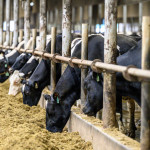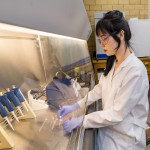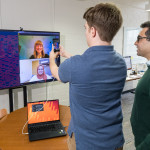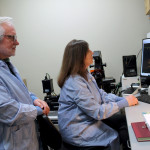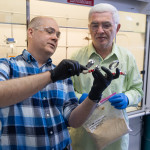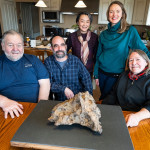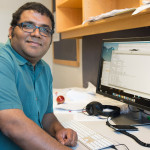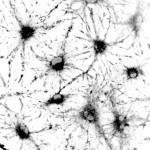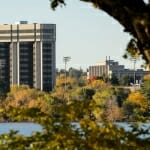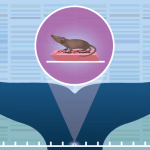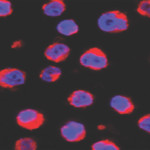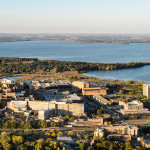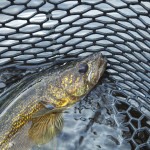Category Science & Technology
UW–Madison physicist Francis Halzen elected to National Academy of Sciences
Halzen directs the UW–Madison Institute for Elementary Particle Physics Research and is the principal investigator of the IceCube Neutrino Observatory. Read More
Update from UW–Madison experts on bird flu spread
UW experts are assisting efforts to track and research the virus with an eye toward minimizing risk to human health and protecting the state’s agricultural sector. Read More
An electrifying discovery may help doctors deliver more effective gene therapies
The researchers exposed liver cells to short electric pulses — and those gentle zaps caused the liver cells to take in more than 40 times the amount of gene therapy material compared to cells that were not exposed to pulsed electric fields. Read More
Popular social media apps use AI to analyze photos on your phone, introducing both bias and errors
An analysis of Instagram found that its vision model categorized more than 500 different "concepts," including age and gender, time of day, background images and even what foods people were eating in the photographs. Read More
Nanomaterial that mimics proteins could be basis for new neurodegenerative disease treatments
The work centers around altering the interaction between two proteins that are believed to be involved in setting the stage for diseases like Alzheimer's, Parkinson's and amyotrophic lateral sclerosis, or ALS. Read More
Eclipse throws shade, delighting campus
Hundreds crowded Library Mall Monday afternoon to peer up at a rare solar eclipse, as the UW–Madison Astronomy Club hosted a live viewing event from noon to 3:30 p.m. Read More
UW–Madison researchers develop better way to make painkiller from trees
The process is primarily water based, relies on green solvents, and is continuous rather than a batch reaction, which makes it ideal for industrial applications. Read More
Exceptional meteorite, plowed up from a Dane County field, finds new home in UW Geology Museum
The hunk of iron weighs in at nearly 110 pounds, is Wisconsin's 15th classified meteorite, and is the first ever recorded in Dane County. Read More
Researchers reveal evolutionary path of important proteins
New research from the University of Wisconsin–Madison decodes the evolutionary pathway of regulatory proteins, the molecules that help control gene expression. Read More
New tool provides researchers with improved understanding of stem cell aging in the brain
By identifying and decoding these autofluorescence signatures, the researchers have developed a tool that can aid in studying adult neurological diseases and aging, but potentially also expand beyond neuroscience. Read More
UW unveils intellectual property models to build industry partnerships
With the Badger IP Industry Advantage program, companies interested in conducting research through the university can avoid some of the speed bumps that have slowed the transfer of technology from research to product. Read More
Some lymphomas become resistant to treatment. Gene discovery may offer path to overcome it.
Researchers have been trying to understand why and how certain lymphoma treatments often stop being effective. Lixin Rui and his team believe they've found the reason — and a potential alternative treatment. Read More
UW–Madison launches Sustainability Research Hub
The hub aims to bring significant interdisciplinary sustainability research funding to campus by connecting researchers across departments and targeting major federal research grants. Read More
Q&A with Prof. Steffi Diem, a UW–Madison fusion scientist and 2024 U.S. Science Envoy
Diem, a fusion energy expert, specializes in heating the ultra-hot fuel for fusion and confining it within efficient and compact magnetic bottles. Her selection as one of four new U.S. Science Envoys highlights growing recognition of fusion's role in building a clean and renewable energy future. Read More
The eyes are a gateway to evolution… of daddy longlegs at least.
While some people may first associate daddy longlegs with well, their legs, researchers from the Department of Integrative Biology have been especially focused on the arachnids’ eyes and what they can tell us about their evolution. Read More
Walleye struggle with changes to timing of spring thaw
Newly-hatched walleye are hungry fish, dependent on meals of tiny zooplankton during the spring. As Midwestern lakes thaw unusually early or late, these prized fish can miss the dinner bell. Read More
New toolkit helps scientists study natural cell death
Taking advantage of the unique biochemical properties of protein fragments, their tool uses less expensive, more efficient, off-the-shelf chemical compounds to help identify sites where proteins were cut. Read More



